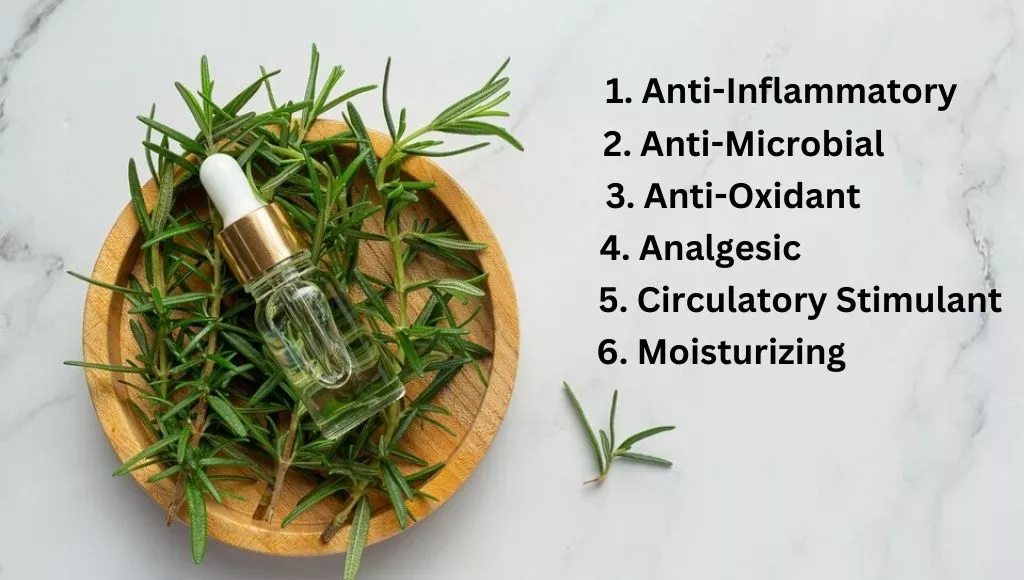Dandruff is a universal problem, and for some individuals, it is evergreen. However, with the right products and remedies, Dandruff is easy to prevent.
Amongst the range of beauty and hair care products circulating in the market, Rosemary Oil is one of the highly trusted ones. Especially when it comes to addressing dandruff and itchy scalp, Rosemary Oil has surprising benefits.
Not only that, but it also addresses other hair care concerns, including breakage reduction, strengthening hair shaft and dullness, and enhancing overall scalp vitality. Rosemary Oil acts as a magic potion for hair, all thanks to the compounds that add to its therapeutic properties.
The Properties Of Rosemary Oil
Here are the key properties of Rosemary Oil that act for hair care and skin care.

- Anti-inflammatory: Rosemary Oil contains Ursolic acid that helps in soothing irritation and inflammation on the scalp.
- Antimicrobial: The presence of compounds like Camphor and Cineole in Rosemary Oil makes it effective against bacteria and fungi. This property makes it an excellent product for treating dandruff and other scalp concerns.
- Antioxidant: With the presence of carnosic acid and rosmarinic acid, Rosemary oil helps in combating oxidative stress. Not only that, but it also prevents damage often caused by free radicals on hair follicles and overall scalp.
- Analgesic, aka Pain Relieving: Due to its mild analgesic properties, Rosemary oil helps in relieving muscle tension and scalp discomfort.
- Circulatory Stimulant: With enhancing blood circulation, Rosemary oil ensures that hair follicles receive an adequate supply of nutrients, adding to hair growth.
- Moisturizing: By moisturizing the scalp and hair, Rosemary oil can help prevent dryness and flakiness on the scalp.
CHECK OUT:- Rosemary Water Recipe For Hair Growth – Easy Steps To Prepare!
How Does Rosemary Oil Work on Scalp For Dandruff?
The effectiveness of Rosemary Oil on the scalp for dandruff is truly multifaceted. Its diverse array of beneficial properties not only treats dandruff but also deals with excessive flakiness, dryness, and scalp irritation.
Typically, the anti-inflammatory characteristics of Rosemary Oil reduce inflammation and contribute to improving the overall scalp health. The antifungal and antimicrobial properties present in this herb oil restore the microbiome balance of the scalp, preventing the occurrence of dandruff. This characteristic is highly crucial since dandruff is a result of Malassezia, a skin fungus, and Rosemary oil shows effective results in calming and soothing its symptoms.
Another common cause of dandruff is the presence of Globosa (a type of Malassezia fungus) and excessive oil build-up on the scalp. However, the anti-fungal and astringent properties of Rosemary oil reduce oil secretion, target the fungus causing dandruff, and soon enough eliminate flakes from the scalp.
CHECK OUT:- Does Rosemary Oil Thicken Hair? Factors That Causes Hair Thinning!
Treating Dandruff With Rosemary Oil- Application and Usage Tip
For first-time users, here are some application and usage tips:
Dilution: Rosemary oil is an essential oil in a highly concentrated form. Therefore, when using it for dandruff (or any skin/ scalp concern), always dilute Rosemary oil with a carrier oil.
The standard ratio is 1 to 2 drops of Rosemary Oil with 1 Tablespoon of any Carrier oil (Coconut Oil, Olive oil, etc).
How To Apply?
- Take the diluted Rosemary oil and massage it gently on your scalp, targeting the areas where dandruff and flakiness are prevalent. Use it as a before-shower treatment, or individuals with dry hair can also use it as a leave-in treatment.
TIP: When dealing with dandruff, always massage your scalp gently instead of adding much pressure. Since dandruff makes hair follicles weak, massaging with pressure can lead to breakage.
Or
- Mix a drop or two of Rosemary oil in your regular shampoo or conditioner.
Or
- Prepare a hair mask by mixing a few drops of Rosemary oil in Aloe vera gel/ Yogurt/ Honey or any other base to increase its overall effectiveness.
Frequency: Start with once or twice a week and observe how your scalp and hair are responding to Rosemary oil. Later, increase the frequency depending on the severity of the dandruff.
Consistency: When using Rosemary oil for dandruff, consistency is the key. Regular usage for a few to several weeks is essential for seeing some positive effects.
Patch Test: Before using Rosemary oil (even the diluted version) on your scalp, perform a patch test either on your underarms or somewhere else. Do not continue usage if you experience irritation.
Overall, remember no matter how many claims you come across, your response to Rosemary Oil may vary. If it isn’t able to address the increasing dandruff on your scalp, consult a dermatologist for expert help.

